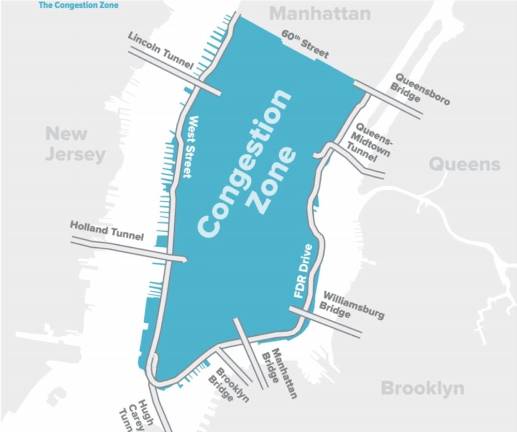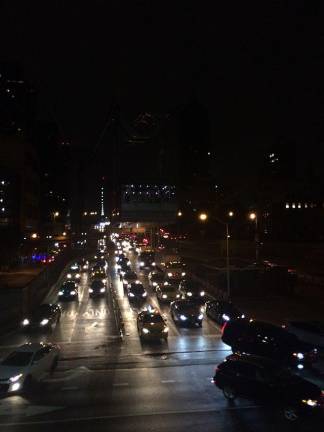UES Residents Opposing Congestion Pricing Seethe At Plan Updates During CB8 Task Force Meeting
The Federal Highway Administration may have given its approval, but controversy still swirls around the congestion pricing plans below Manhattan’s 60th St. A May 30th meeting of Community Board 8’s “Congestion Pricing Task Force” aimed to present victorious updates on the tolling plan. Local residents and board members came prepared with other conclusions, including unverifiable accusations of corruption, boiling rage over traffic redirection, and claims they were being fed “BS.”


Congestion pricing debate is still roiling UES residents, proving the road to final implementation will be a very bumpy ride.
At a May 30th meeting of Community Board 8’s Congestion Pricing Task Force, co-chair Craig Lader had a formidable task laid out for him: condensing thousands of pages of updated rules for the Central Business District Tolling Program–colloquially known as “congestion pricing”–into a digestible PowerPoint for public consumption.
Lader had some key elements of government approval to present, such as the Federal Highway Administration issuing a Final Environmental Assessment and Draft Finding of No Significant Impact (FONSI) on May 5th. In other words, congestion pricing seems liable to pass an environmental review that will be part of a public comment period ending June 12th. If the FONSI is officially approved, a 330 day implementation period will begin for congestion pricing--meaning it could go into effect as early as April of 2024.
There were also plenty of new concessions to establish since the last meeting of the task force on February 16th. The first of these was a low-discount income plan, which would create a twenty-five percent discount for the first ten days of each calendar month.
There will also be overnight toll discounts from the hours of midnight to 4 a.m., a limit of one tolling charge a day for for-hire vehicles (taxis, etc.), and place-based mitigation accounting for pollution (considered locations include the LES, East Harlem, and Randall’s Island). There will also be a Small Business Working Group that will meet six months prior to and six months after implementation, with annual meetings occurring thereafter.
In a FAQ section, Lader basically laid out the city’s raison d’être of congestion pricing, which is to “reduce traffic congestion in the Manhattan CBD in a manner that would generate revenue for future transportation improvements”–such as $15 billion in funding for MTA capital projects.
This all might seem seemingly dry to a layperson, but other Zoom attendees were not pleased in the slightest. To put it mildly, they weren’t buying any of what the task force hoped to sell them.
Leah, who did not give her last name, set the mood by saying “thank you, but this is gonna be a train wreck.” She was promptly followed up by Andrew Fine, who admirably attempted to balance that same strain of politeness with his thinly-veiled thoughts on the injustice being foisted on the community. “We’ve essentially been fighting a phantom,” Fine said of the “carte-blanche” Traffic Mobility Review Board, “where we’re not represented.”
Fine’s overall thoughts on the congestion plan could be summed up by his belief that the agencies approving it are “gonna fleece us for a billion-and-a-half.” Fine also exclaimed his confusion about why “ride-share drivers are just driving around? Why do we care? It’s a fix, like so many other things we endure.” He made clear that he was in part referencing the only-one-per-day toll provisions for minority communities, which have sizable concentrations of ride-share drivers.
Piggybacking off Fine and noting that she “vigorously agreed with him,” resident Elgin Rosa noted that “our council-members support this, and I don’t know why they would.” Another resident, Steven Feldman, seemingly referred to being an occasional ride-share driver that lives on a fixed-income himself–before noting that his wife is a cancer patient relying on NYU doctors, and that she is unable to take public transportation. His thoughts on the congestion pricing plan could be neatly summarized as: “bulls*it”, a description he repeatedly re-emphasized.
Recapitulating the points of all of those that spoke before her, Evelyn David proclaimed: “Shame we weren’t in front of the environmental board that did the review, because they don’t live here. The traffic coming off 62nd St. is going to be complete chaos, and if you don’t think so, you don’t know drivers!” She also said she believed that “very, very powerful people–five or six at the top–are making decisions. Crazy, with traffic and pollution. Crazy, crazy!”
After this fusillade from the public, board members jumped in–but only to accentuate the complaints. Vice Chair Valerie Mason alleged that the environmental approval might have been influenced by money, saying that “The MTA bought off some congresspeople. Even though their constituents were gonna be adversely affected in terms of pulmonary disease and congestion...ok...we’ll pay you $110 million dollars out of the proceeds of congestion pricing.” Mason insinuated that this was a reference to Jerry Nadler and Dan Goldman. It was unclear where the board member got this information from, and it could not be verified by Our Town.
Board member Ed Hartzog, his Zoom background emblazoned with a stop sign modified that appeared to read “www.stopcongestionpricing.com”, quickly jumped into the fray. “I’m getting really tired hearing this canard going around about this done deal,” Hartzog said. Noting that he would adhere to the euphemistic language etiquette of the meeting–for which he received thanks from co-chair Lader–he said that the congestion pricing plan was “hooey. The dysfunctional enablement, like some sort of bad alcoholic family, continues to go on.”
At one point during the meeting, Lader seemed to defensively acknowledge that he expected the torrent of criticism. While clarifying that he didn’t have data, he said that “the community as a whole” appreciates the pricing plan. That being said, Lader quipped that “when it comes to major projects and initiatives...you’re more likely to have those in opposition participate in a process.”
Hannah Weinerman, an aide for Congressman Nadler, hopped in at the end of the meeting to state that “it’s important for me to come here tonight [on behalf of Congressman Nadler] to hear what all of the constituents have to say. I’m absolutely taking notes.” She ducked out before she could become a target of community ire.
As the pricing plan’s task force meeting made clear, the public comment period kicked off by the FONSI was well underway. If the opinions of CB8’s participants are any indication, the Central Business District Tolling Program will continue to receive a tsunami of opposition from some locals--despite its pledges to combat climate change, shore up the MTA, and reduce congestion.